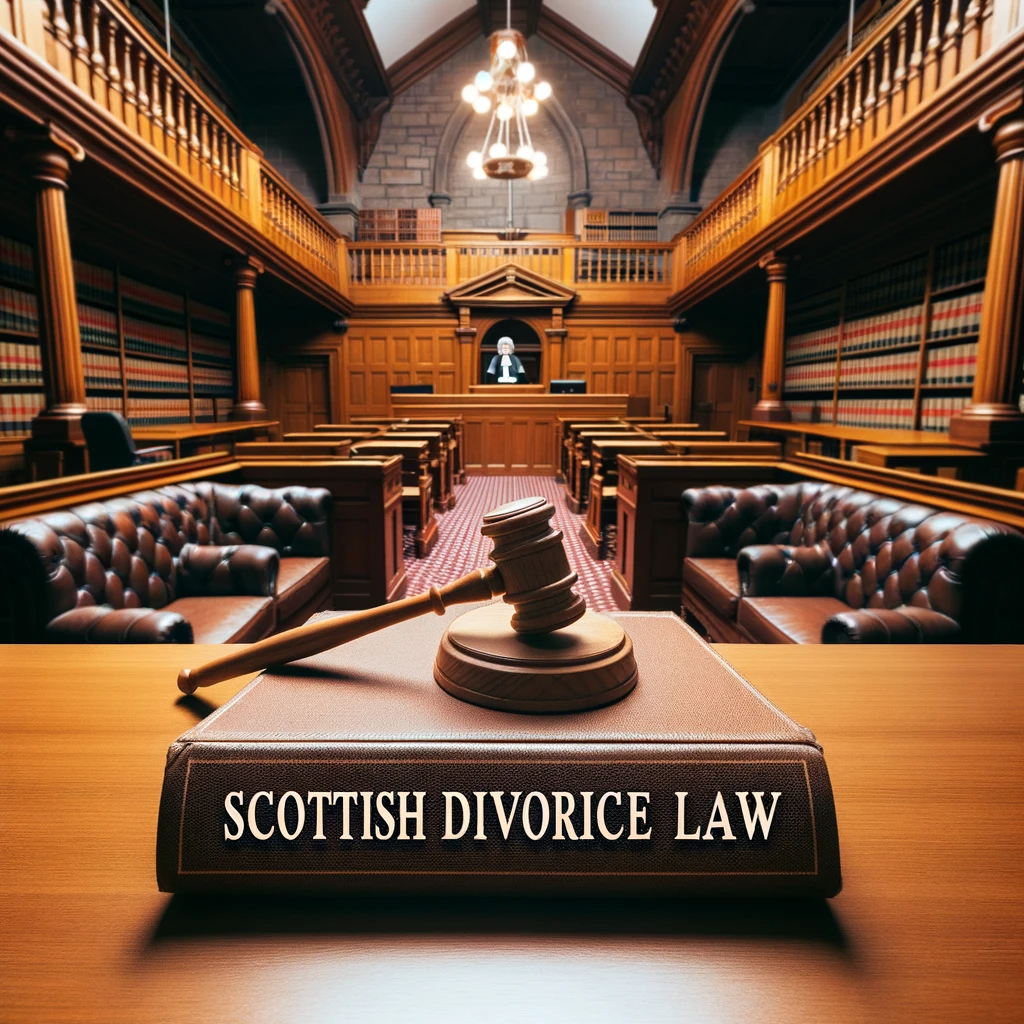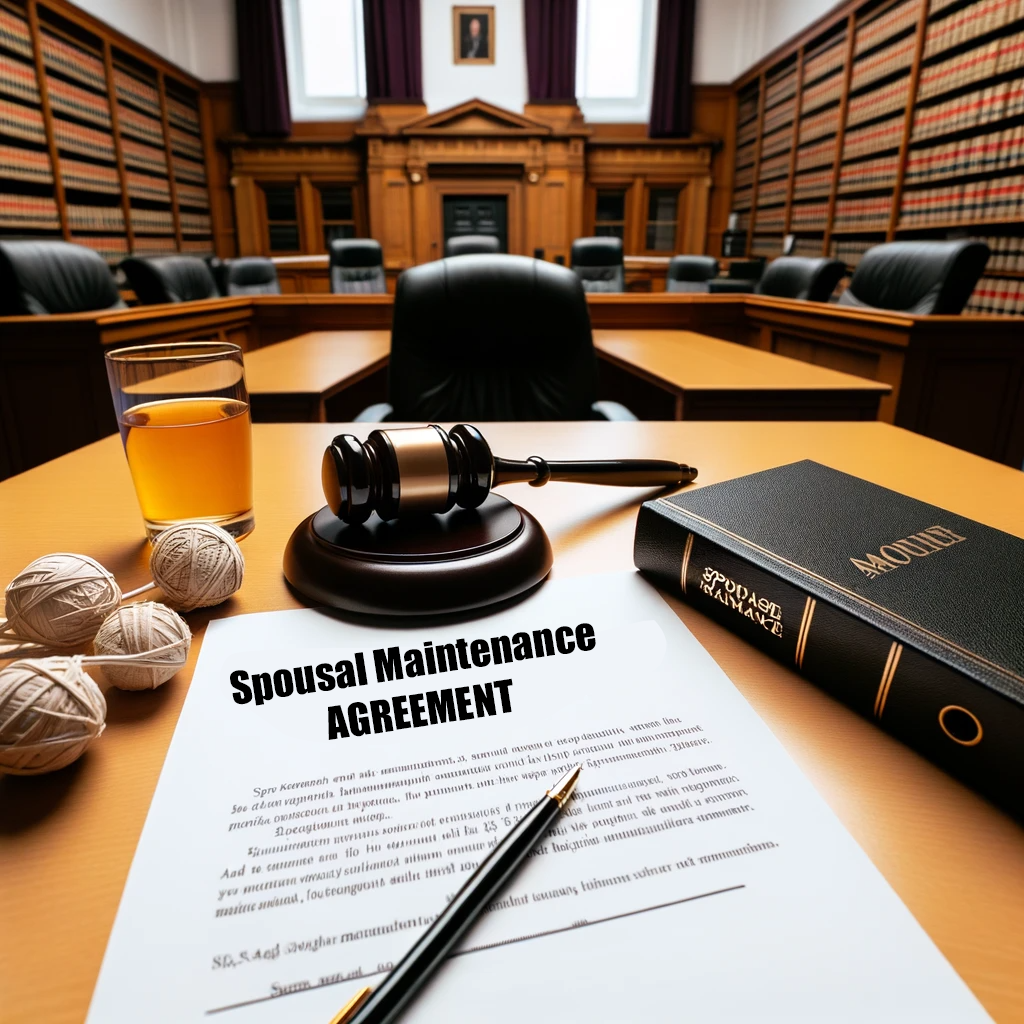Divorce is a challenging process for anyone, regardless of where they live. In Scotland, there are specific laws and regulations that govern divorce proceedings. Understanding Scottish Divorce Law is essential to navigating the legal process more smoothly.
In this section, we will provide an overview of Scottish Divorce Law, highlighting its essential aspects and key differences compared to other jurisdictions. We’ll take a closer look at the grounds for divorce, the divorce process, division of assets and finances, child custody and support, spousal maintenance, mediation, international aspects, legal representation, and considerations for non-Scottish residents.

- Grounds for Divorce in Scotland
- Divorce Process in Scotland
- Division of Assets and Finances in Scottish Divorce Law
- Child Custody and Support in Scottish Divorce Law
- Spousal Maintenance in Scottish Divorce Law
- Mediation and Alternative Dispute Resolution in Scottish Divorce Law
- International Aspects of Scottish Divorce Law
- Preparing for a Scottish Divorce
- Legal Representation in Scottish Divorce Law
- Considerations for Non-Scottish Residents in Scottish Divorce Law
- Conclusion




Key Takeaways
- Scottish Divorce Law has its own unique aspects compared to other jurisdictions.
- Understanding the grounds for divorce and the divorce process is crucial to navigating the legal process more smoothly.
- Division of assets and finances, child custody and support, and spousal maintenance are important factors to consider during divorce proceedings.
- Mediation and alternative dispute resolution methods can help couples reach agreements more amicably.
- International aspects of Scottish Divorce Law, such as jurisdiction and recognition of foreign divorces, may impact your divorce if you have international ties.
- Seeking professional legal guidance is crucial to ensure your rights and interests are protected throughout your divorce journey.
Grounds for Divorce in Scotland
Under Scottish Divorce Law, there are various grounds for divorce, all of which are fault-based. The most commonly cited ground is the irretrievable breakdown of the marriage, which can be established through one or more of the following:


It’s worth noting that, unlike in some other jurisdictions, there is no concept of a “no-fault” divorce in Scottish Divorce Law. This can make it more challenging to obtain a divorce in certain situations, such as where both spouses agree that the marriage has irretrievably broken down but cannot agree on who is at fault.
Adultery
Adultery is defined as voluntary sexual intercourse between a married person and a person of the opposite sex who is not their spouse. If your spouse has committed adultery and you wish to use this as grounds for divorce, you must be able to prove it.
Unreasonable behavior
Unreasonable behavior covers a wide range of actions or behaviors on the part of one spouse that make it intolerable for the other to continue living with them. Examples might include physical or verbal abuse, excessive drinking or drug use, financial irresponsibility, or refusal to engage in sexual relations.
Desertion
Desertion occurs when one spouse abandons the other without a good reason for a continuous period of at least two years.
Living apart with consent
Under this ground, both spouses must have lived apart for a continuous period of at least two years and must both consent to the divorce. It’s important to note that simply living in separate rooms within the same house does not count as living apart.
Living apart for five years
If you have been living apart from your spouse for a continuous period of at least five years, you can use this as grounds for divorce without requiring their consent. This is the only no-fault ground for divorce available under Scottish law.
It’s crucial to have a clear understanding of the grounds for divorce that apply to your situation before initiating divorce proceedings. Seeking the guidance of a qualified family law solicitor can help you navigate this aspect of Scottish Divorce Law with confidence.
Divorce Process in Scotland


Divorce can be a challenging and emotional experience. Understanding the divorce process under Scottish Divorce Law can help you navigate the process more smoothly.
Initiating the Divorce Process
The divorce process begins with the filing of a divorce application, known as a writ, with the Court of Session or Sheriff Court. The writ must state the grounds for the divorce and provide details about any children and financial matters.
It’s important to note that in Scotland, there is no legal requirement for a period of separation before filing for divorce. However, if the parties have been separated for at least one year, it can be used as a ground for divorce.
Serving the Divorce Papers
After the writ is filed, the court will serve the divorce papers on the other party. The person receiving the papers, known as the respondent, has 21 days to respond.
If the respondent does not respond within 21 days, the petitioner can request a decree of divorce. If the respondent contests the divorce, the case will proceed to a hearing.
Negotiating and Reaching Settlements
In Scotland, parties are encouraged to reach agreements on child custody, financial matters, and other issues before the court hearing. This can be done through negotiation between the parties or with the assistance of a mediator.
If an agreement is reached, it will be presented to the court for approval, and a consent order will be issued. If the parties cannot reach an agreement, the case will proceed to a hearing, and the court will make a decision based on the evidence presented.
Attending Court Hearings
If the case proceeds to a hearing, both parties will be required to attend court. The judge will hear evidence from both sides and make a ruling on any contested matters.
After the evidence has been heard, the judge will issue a decree of divorce if the grounds for divorce have been met. If financial matters or child custody arrangements still need to be resolved, the court may issue a schedule of expenses or make an order for child custody.
Finalizing the Divorce
Once all matters have been resolved, the parties can apply to have the divorce made final. A final decree of divorce will be issued, and the parties will be legally divorced.
It’s important to remember that each divorce is unique, and the length of the process can vary depending on the specific circumstances. Seeking professional legal guidance can help you navigate the Scottish Divorce Law process and protect your rights and interests.
Division of Assets and Finances in Scottish Divorce Law
One of the most important aspects of a divorce is the division of assets and finances. Under Scottish Divorce Law, assets and liabilities acquired during the marriage are divided according to the principle of “fair sharing.”


This means that the value of all assets, including property, pensions, savings, investments, and any other ownership interests, is assessed and divided equitably between the parties, taking into account various factors, including:
It’s important to note that “fair sharing” does not always mean an equal split of assets. Rather, it means that the division should be fair and reasonable given the circumstances of the case.
In addition, debts and liabilities incurred during the marriage are also taken into account and divided between the parties, following the same principle of fairness.
Property Division
When it comes to property division, the family home is often the most significant asset. In determining how to divide the property, the court considers various factors, including:
If neither party can afford to buy out the other’s share of the family home, the court may order the sale of the property and split the proceeds.
Pensions
Pensions are also considered a valuable asset in divorce settlements. In Scotland, the value of pensions, both private and occupational, can be shared between the parties.
The court will consider the value of the pension, as well as the length of time the parties were married and contributing to the pension. The value of the pension may be divided, either by offsetting it against other assets or by sharing its value between the parties.
Financial Provision Orders
Finally, it’s worth noting that Scottish Divorce Law allows the court to make financial provision orders to ensure that one party is not left without adequate resources after the divorce.
These orders can include spousal maintenance payments, lump sum payments, or property transfer orders. They are usually made when one party would otherwise be left with insufficient resources to meet their financial needs and can be temporary or permanent.
Overall, the division of assets and finances is a complex and important aspect of any divorce. Seeking expert legal advice early on can ensure that your rights and interests are protected throughout the process.
Child Custody and Support in Scottish Divorce Law
Child custody and support are two of the most important issues to consider during a divorce. Under Scottish Divorce Law, the court prioritizes the best interests of the child when making decisions related to custody and support.


Child Custody: When determining custody arrangements, the court considers various factors such as the child’s age, health, and relationship with each parent. The court may grant either sole or joint custody to one or both parents, depending on what is deemed best for the child. It’s worth noting that the court does not automatically favor one parent over the other based on gender.
Child Support: Child support is typically calculated based on a percentage of the paying parent’s income and the number of children involved. The court may also consider other factors, such as the child’s needs and any special circumstances. It’s important to note that both parents have a legal obligation to financially support their child, regardless of custody arrangements.
It’s important to work with an experienced family law solicitor to ensure your custody and support arrangements meet your family’s needs and protect your child’s best interests.
Spousal Maintenance in Scottish Divorce Law
Spousal maintenance, also known as alimony, is an important aspect of Scottish Divorce Law. When a couple decides to divorce, one spouse may require financial support from the other to maintain their lifestyle and cover their expenses.
In Scotland, the need for spousal maintenance is determined by several factors, such as the income and earning capacity of each spouse, the length of the marriage, and any future financial obligations or responsibilities.


When deciding the amount and duration of spousal maintenance, the court will consider these factors and may also take into account any conduct of the spouses that may have contributed to the breakdown of the marriage.
It’s worth noting that spousal maintenance is not a guaranteed right in Scottish Divorce Law. In some cases, the court may decide that it’s not necessary or appropriate, especially if the spouse seeking maintenance is capable of supporting themselves financially.
However, if spousal maintenance is granted, the payments can be made either as a lump sum or on a regular basis. The amount and duration of payments will depend on the circumstances of each case.
It’s essential to seek legal advice if you are considering seeking or opposing spousal maintenance. A solicitor can help you understand the process, your rights and responsibilities, and the likely outcome of your case.
If you have any questions or concerns about spousal maintenance in the context of Scottish Divorce Law, consider reaching out to a reliable legal professional for guidance.
Mediation and Alternative Dispute Resolution in Scottish Divorce Law
Divorce can be a difficult time for anyone involved, and disputes can often arise during the legal process. Fortunately, Scottish Divorce Law provides couples with options for resolving issues outside of court through mediation and alternative dispute resolution.
Mediation
Mediation involves a neutral, trained third party who helps couples reach agreements on issues such as child custody, support, and the division of assets. The mediator is not a decision-maker, but rather facilitates communication and understanding between the parties.
Mediation can be a more cost-effective and amicable option for couples as it can help them avoid court battles and reach mutually beneficial resolutions. However, it is not appropriate for every situation, and both parties must be willing to participate voluntarily.
Alternative Dispute Resolution
Alternative dispute resolution methods, such as collaborative law and arbitration, can also be used in Scottish Divorce Law. Collaborative law involves each party having their own lawyer, with all parties agreeing to work together to reach a settlement outside of court. Arbitration involves an independent arbitrator making a binding decision on disputes rather than going to court.
These methods can be more structured than mediation and are often used when the issues in dispute are more complex. However, they can also be more costly and time-consuming than mediation.
It is important to remember that these options are voluntary and may not be appropriate in every situation. Seeking legal advice is crucial to determine the most effective way to resolve any disputes.
International Aspects of Scottish Divorce Law
When international ties are involved, divorce proceedings can become even more complicated. Scottish Divorce Law recognizes these challenges and has established specific regulations to address them.
Jurisdiction
One of the most crucial aspects to consider when dealing with international aspects of Scottish Divorce Law is jurisdiction. It is essential to determine which country has the legal authority to hear the divorce case.
In Scotland, the general rule is that the court has jurisdiction if either spouse:
However, if there is a dispute regarding jurisdiction, it is essential to seek legal advice from an experienced family law solicitor.
Recognition of Foreign Divorces
Scottish Divorce Law also recognizes divorces granted in other countries. The recognition of foreign divorces is essential for individuals who have divorced in another jurisdiction and wish to remarry in Scotland.
The recognition of foreign divorces is based on the principle of comity, which means that the Scottish court will respect the decisions made by foreign courts and will only refuse recognition if:
- the foreign court did not have the jurisdiction to hear the case
- the foreign proceedings were contrary to Scottish public policy
- the foreign proceedings were unjust
Cross-border Enforcement of Orders
Scottish Divorce Law also has measures in place to enforce orders made in other jurisdictions.
The main instrument for cross-border enforcement of orders in Scotland is the Brussels II bis Regulation. This regulation aims to ensure speedy and efficient recognition and enforcement of orders relating to divorce, separation, and child custody across EU member states.
Outside of the EU, Scotland also has bilateral agreements with several countries, including the United States, Canada, and Australia, to enforce orders made in each other’s jurisdictions.
It is important to seek legal advice if you need to enforce or contest an order made in another jurisdiction.
Preparing for a Scottish Divorce
Divorce is an emotional and challenging process, and preparing for it can be overwhelming. However, taking the right steps early on can help you navigate the legal process smoothly and protect your rights and interests.
If you’re considering ending your marriage under Scottish Divorce Law, here are some practical tips to help you prepare for the journey ahead:
- Gather necessary documents: Start gathering important documents such as marriage certificates, financial statements, and tax returns. These documents will be necessary for the divorce process.
- Seek legal advice: Speaking to a solicitor who specializes in Scottish Divorce Law can provide guidance on your rights and obligations. They can also help you plan and negotiate the divorce settlement.
- Consider alternatives: Divorce can be a difficult and lengthy process. Consider seeking alternative dispute resolution methods such as mediation or collaborative divorce to reach an agreement more amicably.
- Take care of yourself: Divorce can be emotionally draining, so it’s important to take care of your mental and physical well-being. Seek support from family and friends and consider seeking professional counseling if necessary.
Preparing for a Scottish divorce takes time and effort, but it can help to make the process smoother and less stressful. Remember that each divorce case is unique, and the best way to ensure your rights and interests are protected is to seek the advice of a qualified solicitor.
Legal Representation in Scottish Divorce Law
When going through a divorce, having proper legal representation is essential and can make a significant impact on the outcome of your case. In Scottish Divorce Law, solicitors play a crucial role in guiding you through the legal process and protecting your rights and interests.


A solicitor can provide you with legal advice and support in various aspects of your divorce, including negotiations with your spouse, filing court documents, and representing you in court. With their legal expertise, they can help you navigate the complex legal process and ensure that you receive a fair settlement.
If you have concerns about the cost of legal representation, there are options available for you. Some solicitors offer affordable rates or payment plans, and in some cases, you may be eligible for legal aid, which provides financial assistance for individuals who meet specific criteria.
It’s important to choose a solicitor who has experience in family law and Scottish Divorce Law specifically. They should have a good understanding of the legal system and be familiar with the courts in your area. You may want to consider meeting with several solicitors to find one that you feel comfortable working with and who understands your unique situation.




Summary
In summary, having a solicitor represent you in Scottish Divorce Law is crucial to ensure that your rights and interests are protected throughout the legal process. They can provide you with legal advice and support, help you negotiate with your spouse, and represent you in court if necessary. Be sure to choose a solicitor with experience in family law and Scottish Divorce Law, and consider options for affordable legal representation.
Considerations for Non-Scottish Residents in Scottish Divorce Law
Divorcing under Scottish law as a non-resident can present unique challenges. Here are some aspects to consider:


- Jurisdiction: Scottish courts have jurisdiction over a divorce if either spouse has lived in Scotland for at least a year, or if both spouses are habitually resident in Scotland. If you are a non-Scottish resident, you may need to establish your connection to Scotland to proceed with a Scottish divorce.
- Legal representation: It is advisable to seek legal representation from a Scottish solicitor who is experienced in dealing with cross-border divorces. They can provide guidance on the legal process and ensure your rights are protected.
- Financial matters: If you or your spouse has assets or income in a foreign country, it may complicate the division of finances. A solicitor who has experience with international divorces can help you navigate this aspect.
- Child custody: If you have children, their habitual residence may impact custody arrangements and child support. The laws of the country where your child is habitually resident may apply instead of Scottish law.
- Enforcement of orders: If you or your spouse resides outside of Scotland, enforcing court orders can become more complex. A solicitor can advise you on the procedures for cross-border enforcement of orders and any relevant treaties or conventions.
Overall, it’s crucial to seek legal guidance from an experienced solicitor familiar with Scottish Divorce Law and international divorces if you are a non-Scottish resident going through a Scottish divorce. They can help you understand your rights and obligations and guide you through the process with confidence.
Conclusion
Scottish Divorce Law can be complex and challenging, but by understanding the key aspects and differences, you can navigate the legal process more effectively. Remember that seeking professional legal guidance is crucial to ensure your rights and interests are protected throughout your divorce journey.
From the grounds for divorce to the division of assets and finances, child custody and support, spousal maintenance, mediation, and alternative dispute resolution, we have covered the essentials of Scottish Divorce Law in this article. We have also addressed the international aspects, considerations for non-Scottish residents, and practical tips for preparing for a Scottish divorce.
Whether you are a Scottish resident or not, going through a divorce can be emotionally and financially draining. However, with the right support and guidance, it can also be a new beginning. We hope this article has provided you with valuable insights into Scottish Divorce Law and helped you prepare for the road ahead.




Remember
Scottish Divorce Law is a nuanced and complex legal area, and it’s important to seek professional legal guidance. This way, you can ensure your rights and interests are protected and make informed decisions throughout the process. Good luck!



FAQ
What are the grounds for divorce in Scotland?
The grounds for divorce in Scotland include adultery, unreasonable behavior, and living apart for a continuous period of at least one year (with consent) or two years (without consent).
What is the divorce process in Scotland?
The divorce process in Scotland involves filing a divorce application, serving it to your spouse, and attending court hearings if necessary. It typically takes around four to six months to finalize a divorce.
How are assets and finances divided in Scottish divorces?
Assets and finances are divided in Scottish divorces using the principle of equitable distribution. The court considers factors such as each spouse’s financial resources, contributions to the marriage, and future needs.
How is child custody determined in Scottish Divorce Law?
Child custody in Scottish Divorce Law is determined based on the best interests of the child. The court considers factors such as the child’s welfare, relationship with each parent, and ability to meet their needs.
Is spousal maintenance awarded in Scottish divorces?
Spousal maintenance, also known as alimony, may be awarded in Scottish divorces if one spouse cannot support themselves financially. Factors such as income, earning capacity, and financial needs are considered when determining the duration and amount of maintenance.
What is the role of mediation in Scottish Divorce Law?
Mediation is an alternative dispute resolution method available in Scottish Divorce Law. It helps couples reach agreements on issues such as child custody, division of assets, and financial matters outside of court, with the assistance of a neutral mediator.
How does Scottish Divorce Law handle international aspects?
Scottish Divorce Law addresses international aspects such as jurisdiction, recognition of foreign divorces, and cross-border enforcement of orders. It is important to seek legal advice if you have international ties to understand how these factors may impact your divorce.
What should I do to prepare for a Scottish divorce?
To prepare for a Scottish divorce, gather all relevant documents such as marriage certificates, financial records, and property deeds. Seeking legal advice and understanding your rights and obligations can also be beneficial.
Is legal representation necessary in Scottish Divorce Law?
While legal representation is not mandatory, it is highly recommended to have professional guidance throughout the divorce process. Divorce can be complex, and a solicitor can ensure your rights and interests are protected.
What considerations do non-Scottish residents face in Scottish Divorce Law?
Non-Scottish residents going through a divorce under Scottish Divorce Law may face considerations such as jurisdictional issues and the need to understand the differences between Scottish and other legal systems. Seeking legal advice specific to your situation is crucial.





Leave a Reply